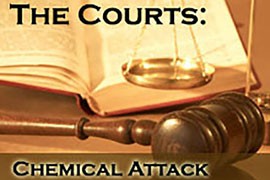Cronkite News has moved to a new home at cronkitenews.azpbs.org. Use this site to search archives from 2011 to May 2015. You can search the new site for current stories.
Court upholds chemical weapons conviction for Tucson contractor
WASHINGTON – A federal appeals court upheld the conviction Monday of a Tucson contractor who set off a homemade chlorine bomb at a former customer’s home in 2009, creating a noxious cloud that forced a neighborhood evacuation.
A three-judge panel of the 9th U.S. Circuit Court of Appeals said prosecutors could use a federal chemical weapons ban to charge Todd Russell Fries – also known as Todd Burns – because of the scope of the incident.
“Fries’ use of a chlorine bomb produced a dense chlorine gas cloud estimated to have been ’1,000 feet high and roughly 200 feet deep’ that injured several people including first responders, and required the evacuation of an entire neighborhood and implementation of HAZMAT procedures,” said the opinion by Circuit Judge Johnnie B. Rawlinson.
The panel also rejected Fries’ claims that certain evidence and statements at his trial were inadmissible and that an obstruction of justice charge was improperly applied, upholding both his 2012 conviction and sentence of more than 12 years.
The U.S. Attorney’s Office declined to comment on the case Monday. A call to Fries’ attorney was not immediately returned.
The attack was directed at Myles and Karen Levine, Tucson homeowners who stopped payment on a $200 check to Fries because they were dissatisfied with driveway work his company had done for them.
In 2008, court records said, the Levines’ home was vandalized with anti-Semitic graffiti, their driveway covered in what appeared to be a mixture of paint, motor oil and packing peanuts, and a pile of animal carcasses left in their yard.
The Levines had moved to another neighborhood when a similar attack occurred in August 2009. Besides the graffiti and the “thick, viscous, slimy material” and foam peanuts on the driveway, there were “rabbit, cat, coyote and numerous woodpeckers” carcasses in the yard.
This time, however, the front door, windows and garage door of the home had been sealed with “a foam expanding seal” that kept the Levines from escaping. There was also a “large pile of burning, gas-emitting debris” in the driveway and a burning bucket of “oozing debris” on the back patio.
“The whole thing was ridiculous,” Myles Levine said Monday. “It was over nothing – just because I stood up to him.”
The fires resulted in a dense, chlorine cloud that hung over the neighborhood for an hour. The neighborhood was evacuated.
Pima County sheriff’s deputies who responded reported burning eyes and throats and difficulty breathing, and a firefighter measured unsafe levels of chlorine gas in the garage of the home.
Levine, who said he was ill at the time, said he and his wife couldn’t breathe during the attack, but that they suffered no permanent damage.
Two days after the incident, the FBI was contacted by “a man attempting to sound like a female” who claimed to have information on the attack. The source claimed to be a former housekeeper who had complained about the Levines to an “extremely violent” cousin, and said the cousin had stolen chlorine tablets and put them in buckets around the home.
The source gave the name of a woman whose day planner and check were found at the Levines’ home. But the woman named told police that her purse had been stolen in 2007, with her day planner and other ID in it, and that she had never worked for a cleaning service.
FBI agents also testified that they had recovered a woman’s ID at the scene of the 2008 attack that had also been reported stolen.
Fries’ fingerprints were found on items at both scenes and his employees testified that he made them collect roadkill and talked about retaliating in what he called “the Levine project.” Fries was convicted in U.S. District Court in Tucson in 2012.
The 9th Circuit Court found Monday that because Fries’ actions had the potential to “cause severe harm to many people” his conviction was “entirely proper.”
“Taking account of the chemicals used by Fries and the circumstances under which he used them … we conclude that (section) 229 applies to Fries’ criminal conduct, and is a constitutional exercise of congressional authority,” the court said, citing the chemical weapons ban under which he was charged.
Myles Levine said Monday the appeals court “got it right.”







